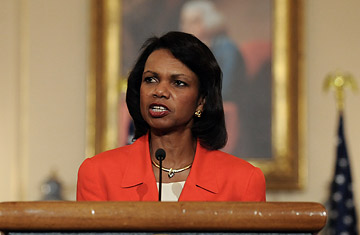
US Secretary of State Condoleezza Rice.
(9 of 17)
ISAACSON: What about the military buildup he did, how much credit do you give that and Thatcher?
RICE: I give the military buildup considerable credit because I think the Soviet Union now faced a very difficult choice: Are we going to try again to challenge the United States? This was a country that had already spent 35 patient of its GNP on defense. What was it going to do in the face of another American challenge? When we talk about great American Presidents and I will admit to, I'm a foreign policy specialist, so, I perhaps look at the foreign policy side. But American Presidents who can mobilize the tremendous assets that the United States brings to the international table are the most important Presidents of the century. And Ronald Reagan understood that the United States had more to say and more to do where communism was concerned.
ROSE: Dan, we are now talking about foreign leaders as well as domestic leaders. And when we do that, I would like to open this question up with respect to Lenin, Stalin, as precedent to Gorbachev and what followed. Lenin, Stalin, Hitler, Mao Tse Tung, who thinks that among those that I've just listed, considering evil and good but considering the consequences of their impact, should be put at the top rank of the most influential people of this century, since FDR clearly is on everybody's list. Doris, how do you make the case for or against Hitler?
KEARNS-GOODWIN: Well, there's no question that when you look at the consequences of Hitler being in Germany at the time of the Depression, assuming power as he did, launching his world war which he launched — in many ways, there's a case where the individual absolutely had an impact on the time — launching his world-wide program for the Destruction of the European Jewry, thereby creating World War II, thereby changing the whole power relations in the world where America arises as a preeminent power, the Soviet Union comes forth and we have this bipolar world afterwards. There's no question about the consequences of an Adolph Hitler. It's just, it's just so hard to even want to accord him anything even the term great when we're using it neutrally when we know what that greatness means. So, I'll just go back feeling happier to talk about Winston Churchill for a second and stick him [unintelligible].ROSE: Well, go ahead, talk about Winston Churchill because let me just make — Walter, TIME Magazine shows the most influential person of the first half of the century and it was?
ISAACSON: Winston Churchill.
CUOMO: All right.
ROSE: So, tell us about Churchill.
ISAACSON: Although I don't know that we'd do it again.
KEARNS-GOODWIN: Oh, no, I think you would do it again, I promise you. Look, here's a man who during that period —
[Laughter]
KEARNS-GOODWIN: —during that period of time, from 1940 to 1941/2 when America finally entered the war, it was his voice, it was his words, it was his confidence that helped buoy the British people, giving them the strength. Here's a case where a leader was able to project his confidence and his inspiration to a people who were bombed every night by Germany, get up the next morning and go to work. They could not break the will of the British people. I mean this man's ability to speak is just unparalleled I think in the 20th century. I mean my favorite story of that is when Roosevelt goes into his bedroom when they're in the White House together during World War II to tell him he's just come out with a whole new idea for calling the Allied Nations the United States Nations, this is where the word gets born. And it turns out that Churchill is just stepping out of the bathtub and has nothing on. So, Roosevelt says, I'm so sorry, I'll come back in a minute. Churchill, ever able to speak spontaneously, says, oh, no, please stay, the Prime Minister of Great Britain has nothing to hide from the President of the United States. Now, when you have a man that can use words like that, but more seriously there's a case where I do think that the power to believe in a leader and the leader to give you courage and strength affected an entire British people. Now, there's other problems with him of colonialism and other stuff that I will take him down but on that score it was a critical moment in world history.
ROSE: But how does he compare to Pope John the 23rd?
KEARNS-GOODWIN: I'm not going to heaven if I don't stop.
[Laughter]
ROSE: What do you as an historian believe that Hitler might have won the war without the voice and the will of Winston Churchill in World War II?
KEARNS-GOODWIN: I think it is very possible that if Churchill had not been at that leadership post in Britain, had Hitler not made the mistake of not invading England instead of Russia and gone after England, weakened, say, by a Chamberlain, that if all of Western Europe had been destroyed by Hitler and America was left to stand alone against that before we were ready, we got two years breathing space because Hit — because England was able to stand against Hitler, that, yes, I think the war could have turned around a different way.
